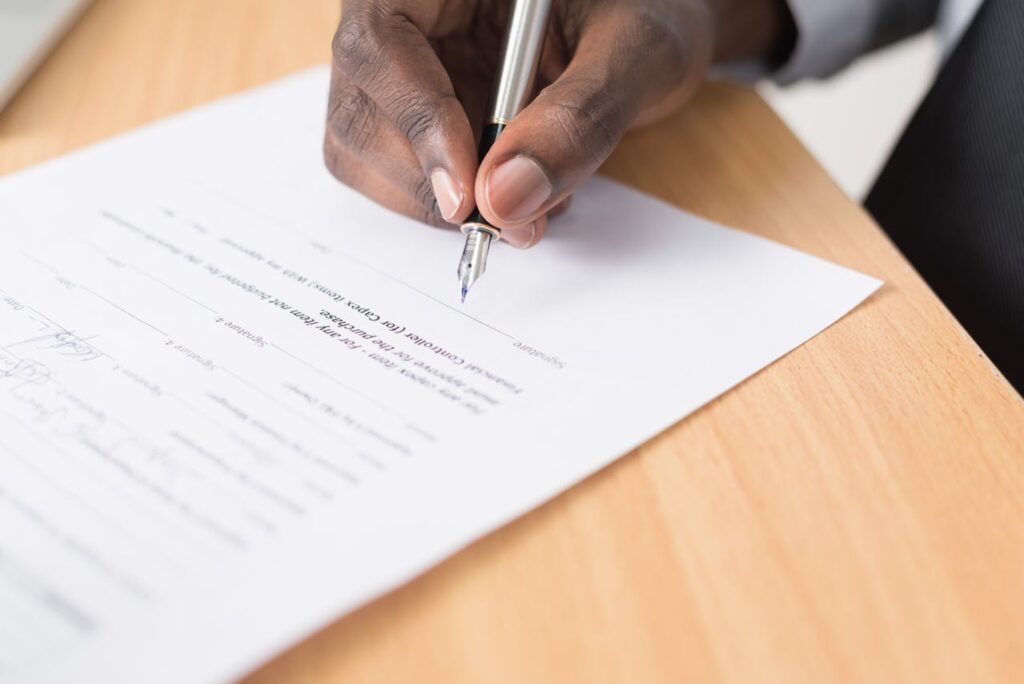Dishonoured Cheques and Notices of Dishonour

In the current era of contactless payments, pay-by-phone, and online banking, a world where you pay for your groceries and meals out with cash — let alone cheques – can be hard to imagine.
You may have never written a cheque in your life…
So, what is a cheque, exactly?
What is a Cheque Under UK Law?
Cheques are a form of a bill of exchange. Essentially, a cheque is a paper voucher linked to peoples’ or businesses’ current accounts and can be used to pay for goods and services.
Interestingly, the rules around cheques are governed by a statute from Victorian times that remains in force today, called the Bills of Exchange Act 1882 (“the Act”).
Section 3(1) of the Act states:
“A bill of exchange is an unconditional order in writing, addressed by one person to another, signed by the person giving it, requiring the person to whom it is addressed to pay on demand or at a fixed or determinable future time a sum certain in money to or to the order of a specified person, or to bearer.”
In simple terms, this means that if you were to write a cheque today for £50 to your utilities supplier, the supplier would likely accept it as a promise that the monies will be deposited into their account when they cash the cheque.
Cheques remain an essential component of many business transactions. The recipient of a dishonoured cheque can apply for summary judgment for non-payment of the cheque and will almost certainly succeed.
Only in limited and exceptional circumstances will summary judgment be denied.
What Can You Do if a Cheque Is Dishonoured?
When goods or services are paid for by cheque, two separate contracts exist:
- The contract for the supply of the goods or services; and
- An unconditional promise to pay the recipient.
If the cheque is stopped, you can sue on the original supply contract. But taking this path opens the door for the counter-party to dispute the quality of the goods or services.
More simply and easily, you can sue on the stopped/bounced/dishonoured cheque.
Possible Defences Against Summary Judgement for a Dishonoured Cheque
A successful defence may be sufficient to avoid summary judgment or provide grounds for a stay of execution.
Existing defences may be characterised as absolute defences, defects in title, and personal defences. The difference lies in the nature of the person or business against whom the defence can be raised — the original payee or a subsequent holder.
Defence of Fraud or Duress for a Dishonoured Cheque
The fraud defence relies on the maxim” fraud unravels everything”, as found in Lazarus Estates Ltd v Beasley [1956]. To succeed, evidence of the fraud must be clear and documented. According to Lord Denning in this ruling: “Once [fraud] is proved, it vitiates judgments, contracts, and all transactions whatsoever”.
The defence of duress derives from the English law principle that a contract obtained by illegitimate forms of pressure or intimidation is voidable. Duress as a defence against a dishonoured cheque generally requires evidence of:
- Actual or threatened violence
- Unlawful imprisonment (common law duress)
- Pressure or coercion (equitable duress)
- Economic duress
- Undue influence
Defence of Misrepresentation for a Dishonoured Cheque
A defence of misrepresentation is often a veiled complaint about the quality of goods and/or services.
Without the commission of fraud, misrepresentation of goods or services is not a justifiable defence to a claim on a cheque. If the misrepresentation is fraudulent, however, then the defence of fraud may apply.
Failure of Consideration as a Defence for a Dishonoured Cheque
Failure of consideration relies on the premise that a cheque is a contract. The court will not enforce a contract without consideration,
The failure of consideration defence succeeded in A.E.G. (UK) Limited v Mrs Lewis (Married Woman) [1992]. Briefly, the facts of the case were that Mr Cash had some repairs carried out to his central heating system.
The work was done by an engineer employed by a firm of heating engineers. Mr Cash was not at home when the engineer completed the job. His daughter (the defendant) paid for the repairs by drawing a cheque on her bank account, which she gave to the engineer.
When Mr Cash returned, he discovered that the heating was not working properly and his daughter stopped the cheque. The Court of Appeal was divided on this issue but ultimately held (2:1) that the engineer had no authority to accept a cheque to discharge Mr Cash’s liability — and therefore give consideration for the cheque. The daughter was consequently entitled to stop the cheque.
Illegality as a Defence for a Dishonoured Cheque
The “illegality defence” is founded on public policy and arises when the defendant argues that the claimant should not be entitled to customary rights or remedies because they have been involved in illegal conduct linked to the claim.
Steps to Take When a Cheque is Dishonoured
The Act prescribes a strict procedure upon receipt of a dishonoured cheque. If the correct process is not followed, you will lose the cause of action.
Section 48 and 49 of the Act require you to give the payor a written “notice of dishonour” by letter.
The notice should include the following:
- Cheque number
- Account number
- Bank name
- Amount
- Non-payment as the reason the cheque was dishonoured
The Act requires the notice to be given “within a reasonable time”. Unless there are “special circumstances”, the notice should be sent by post on the day after dishonour (at the very latest).
Timing of the notice of dishonour is imperative to achieving protection under the Act.
Upon correctly serving a notice of dishonour, you can issue proceedings for summary judgment without further notice.
Conclusion
If you’re a supplier that’s been paid for goods or services with a dishonoured cheque, time is of the essence.
Helix Law’s expert team of business debt recovery specialists can give you immediate advice on how to proceed and preserve your rights under the Bills of Exchange Act 1882.
If you have stopped payment on a cheque to a supplier, it’s essential to be aware that the bar for successfully defending a dishonoured cheque or notice of dishonour is high. You should seek legal advice immediately.


